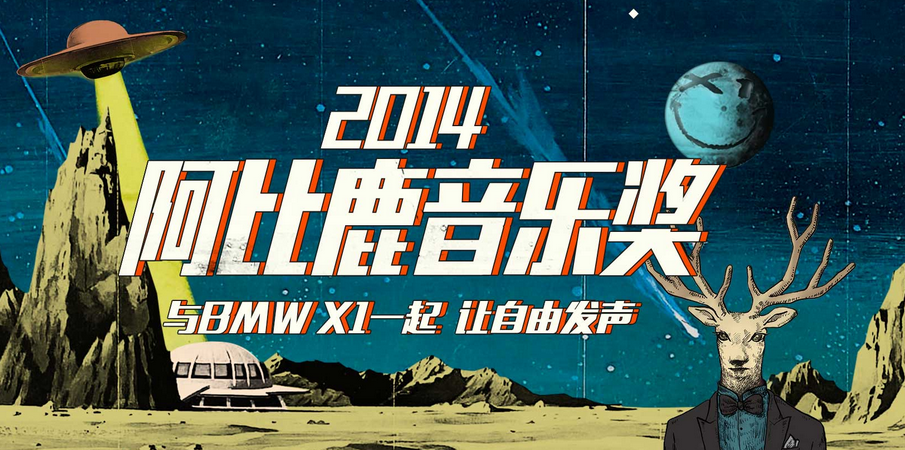On the 2nd February Douban Artists announced the Abilu (阿比鹿) Independent Music Awards 2014 winners. Established in 2011, the role of the awards is to celebrate some of China’s brightest independent stars (with an emphasis of course on those for whom Douban forms a pillar of their musical careers), while exposing them to a greater audience. Kepler by Sun Yanzi (Stephanie Sun) won the Most Popular Pop Record award, while Chengdu underground indie rock band Hiperson won the attention and love of the judges and was crowned as Newcomer of the Year (for a full list of nominees see below).
What is interesting about Abilu – along no doubt with a swathe of other industry awards programs and ceremonies (legitimate and self-congratulatory wine and dines alike) is the role that data has come to play in the way we bestow awards on and recognize individuals and groups for creative excellence. This year the Abilu awards introduced a panel of judges comprised of 40 senior Douban music users and 15 overseas music professionals (without any ties to the Chinese music industry, which kind of reinscribes the idea that the Anglo-American music industry represents some kind of a global litmus test for quality). But for the other years, winners were selected purely based on data points and a vaguely defined user-generated algorithm (perhaps based on search results and track plays among other things).
It’s little surprise that an awards ceremony supported by a tech company was originally conceived in this way, and to be fair its not that different from awarding artists based on sales performance. But isn’t it just a little troubling that the arts now, have become swept up in the tyranny of global data dependence? People aren’t content to allow talent to speak for itself, they want to measure it and prescribe algorithms to establish whether one album is worthy of a playlist versus another, or whether one artist deserves recognition versus another. Artist bookings, signings, the brokering of band/brand partnerships – it’s all become overwhelmed by the need to frame every decision within a cold, calculative paradigm where ROI for shareholders is the only thing that really counts.
And let’s not delude ourselves: as supportive as Douban has been to the industry, the real purpose of all this is to encourage artists to do more with the platform, so more traffic gets directed to the platform, so the Douban team can work up a sustainable business model around the audience. The agenda is the same for every social network and content platform that leverages a freemium business model. Those of you in the west witnessed first hand the epic bait-and-switch Facebook pulled off, which involved encouraging everyone – from creators to businesses with deep pockets – to get on board, then changing their algorithms so getting heard suddenly became a pay-to-play game.
Awards shouldn’t be about recognizing who can shout the loudest, or who is able to create the biggest buzz online by churning up micro-message storms, viral content or any other gimmicky ploy to draw eyeballs. By placing data at the center of the awarding mechanism instead of some more nebulous but heartfelt appreciation of talent, those metrics in some cases risk becoming the site of the artists’ pursuits. “Come on guys, we need to push for more listens, make sure you’re sharing something every day, make sure you are engaging”. Suddenly the artist’s role becomes something more…productive. Creating music becomes threatened by a new kind of socialised productivity that renders all output as a commodity. Awards cease to symbolize anything truly remarkable, but are based instead on the success of the artist as information worker; those who churn digital commodities that lack the longevity of a music album (which many rightly or wrongly proclaim to be dead).
Abilu is probably a good thing, and Douban has done a lot to support and empower artists. Congratulations to the winners – let’s hope they continue to push the boundaries and show the world China has its own unique sound to offer.
You can watch the promotional video HERE.
2014 Abilu Awards Winners List
Most Popular Musician:
– Pop: Hua Chenyu(华晨宇)
– Rock: Carsick Cars
– Folk: Liang Xiaoxue (Kulu) (梁晓雪)
– Rap: fatshady
– Electronic: Zaliva D
– World / Easylistening / OST: Hanggai(杭盖)
Most Popular Album:
– Pop: Kepler (《克卜勒》)by Sun Yanzi (Stephanie Sun) (孙燕姿)
– Rock: Better Late Than Never (《相见恨晚》)by Kidney(腰)
– Folk: Lonely Island(《孤岛》)by Ma Di (马頔)
– Electronic: Portrait of the Heavenly Palace(《天宫图》) by Dou Wei / Zi Feng / Mo Xi Zi Shi (窦唯/子枫/莫西子诗)
Most Popular Single:
– Pop: “1987 I Didn’t Know I Would Meet You (1987我不知会遇见你)” by Li Yuchun(李宇春)
– Rock: “So I Do Not Sing Again(于是我不再唱歌)” by Life Journey (旅行团)
– Folk: “If I Have To Die I’d Die At Your Hand (要死就一定要死在你手里)” by Mo Xi Zi Shi (莫西子诗)
– World / Easylistening / OST: “Blasses Angsicht” by Bloody Woods
Most Popular New Comer:
– Xu Fei (徐菲)
Musician of the Year:
– Pop: Wei Ruxuan (魏如萱)
– Rock: Wangwen (惘闻)
– Folk: Mo Xi Zi Shi (莫西子诗)
– Electronic: MHP
– Rap: J Fever (小老虎)
– World / Easylistening / OST: Hanggai (杭盖)
Album of the Year:
– Pop: Age For Marriage (《适婚的年龄》)by my little airport
– Rock: Better Late Than Never (《相见恨晚》)by Kidney (腰)
– Folk: Open Country (《原野》)by Mo Xi Zi Shi (莫西子诗)
– Electronic: Portrait of the Heavenly Palace(《天宫图》) by Dou Wei / Zi Feng / Mo Xi Zi Shi (窦唯/子枫/莫西子诗)
Single of the Year:
– Rock: “Love Letter (情书)” by Kidney (腰)
– Pop: “Missed Call(未接来电)” by Yang Naiwen(杨乃文)
– Folk: “South of the South Mountain(南山南)” by Ma Di(马頔)
– Electronic: “Detache Toi” by -M- & AM444
– Rap: “Insomnia For Billions of Light Years(亿万光年失眠)”by J Fever(小老虎) – World / Easylistening / OST: “Blasses Angsicht” by Bloody Woods
New Comer of the Year:
